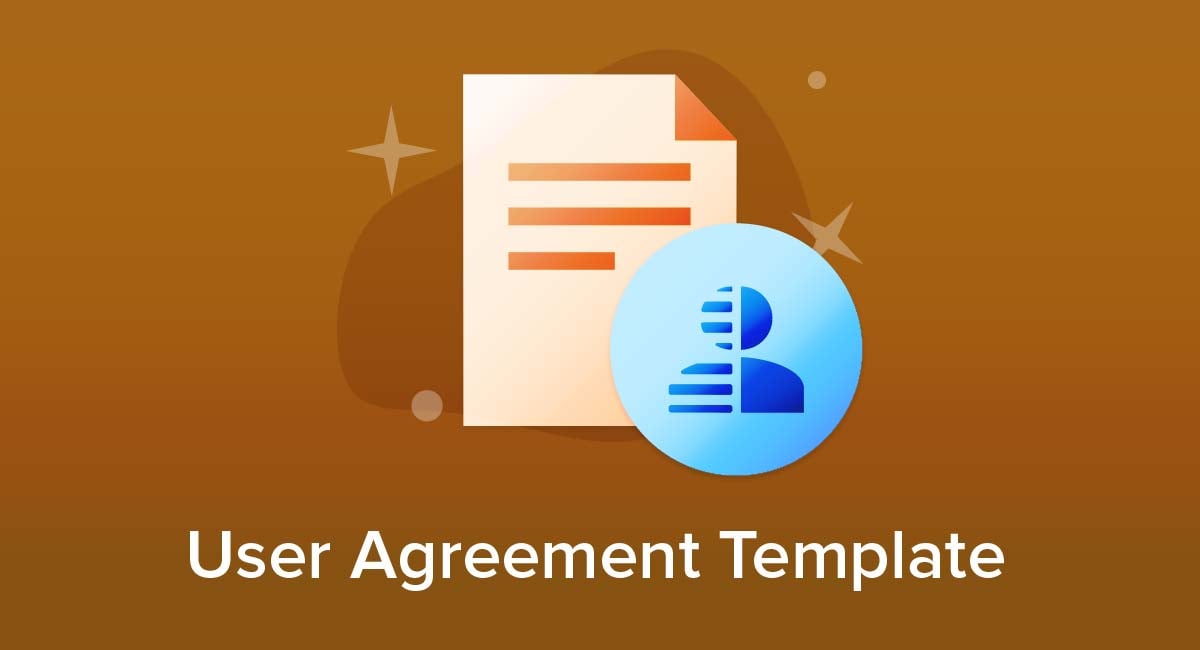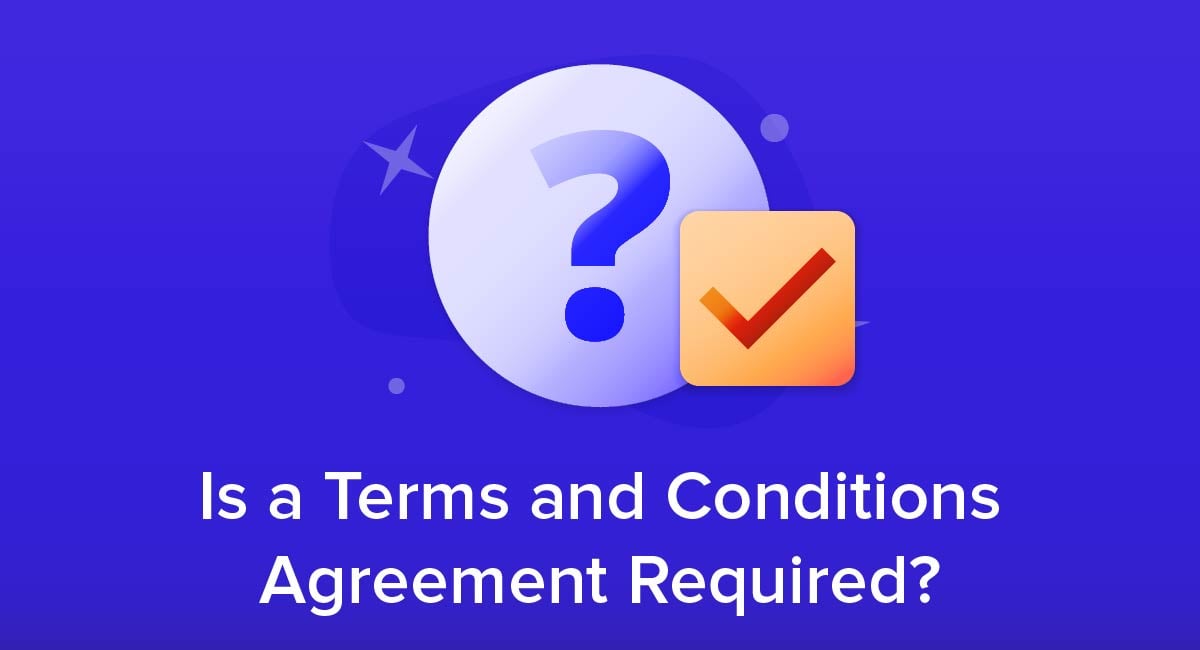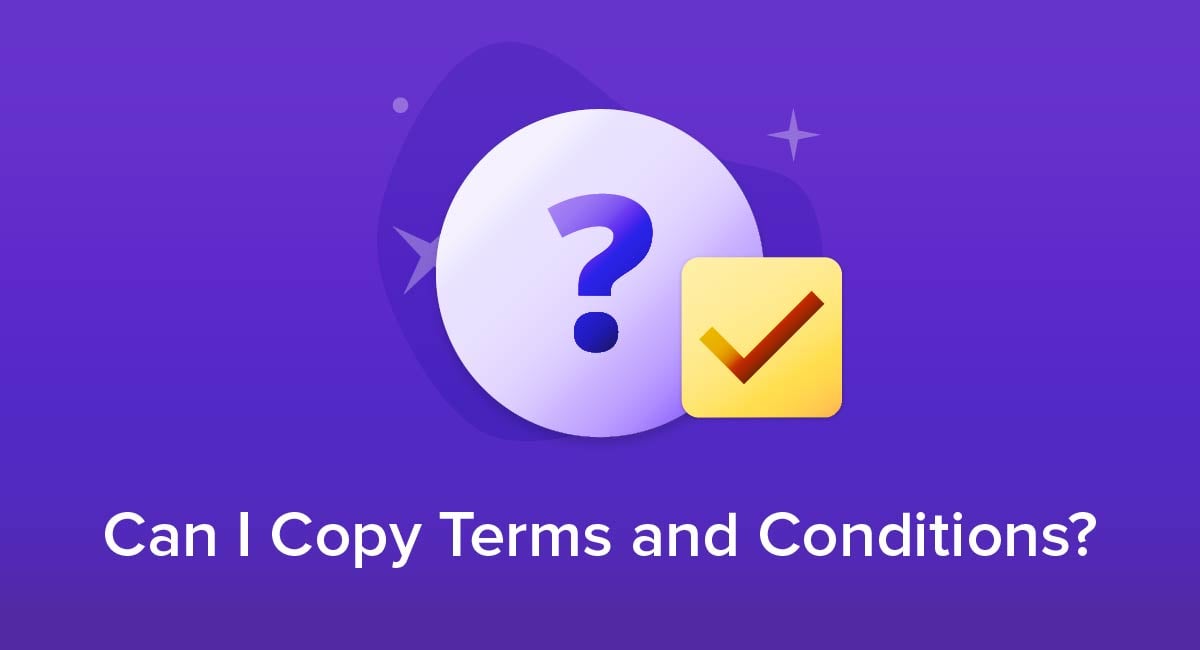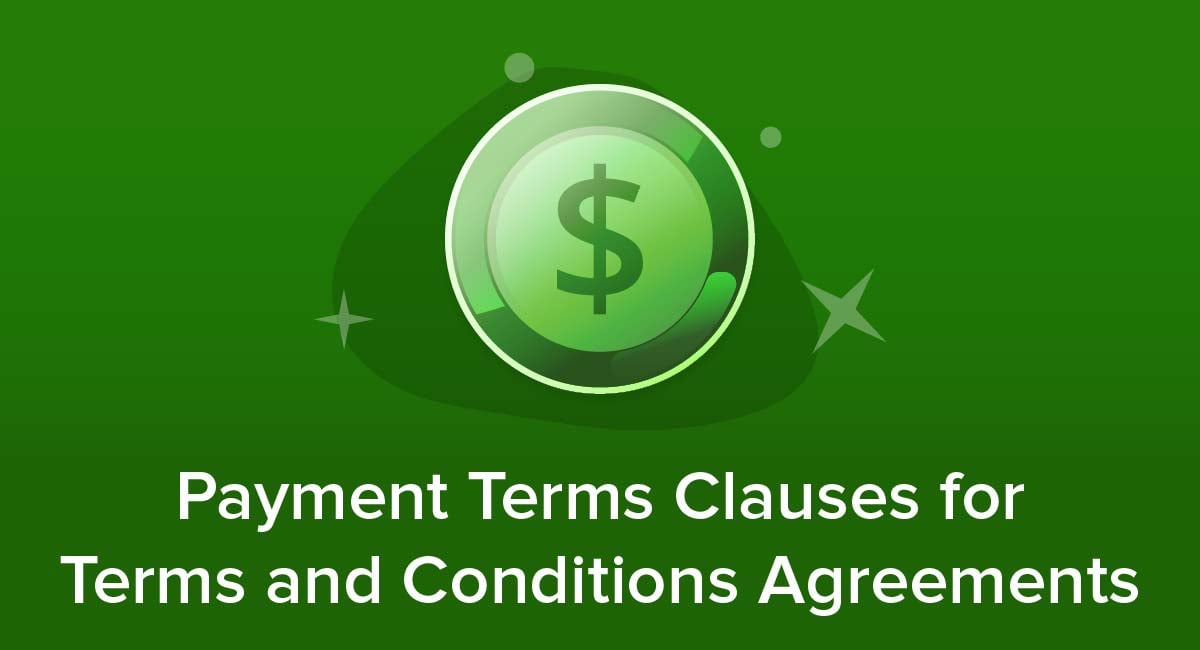
A Payment Terms clause in a Terms and Conditions agreement is where you set out some key points regarding how you handle and accept payments.
In this guide we'll break down key payment points that you may want or need to address in your Terms and Conditions agreement via this specific type of clause, and give some examples of how businesses do it in practice.
Our Free Terms and Conditions Generator is created to help you generate a professionally drafted agreement that can include various terms and conditions for your site and/or app.
- Start the Free Terms and Conditions Generator from our website.
- Select platforms where your Terms and Conditions will be used (website, app or both):
- Answer a few questions about your website or app information:
- Select the country:
- Answer a few questions about your business practices:
-
Enter your email address where you'd like to receive the new Free Terms and Conditions and click "Generate":
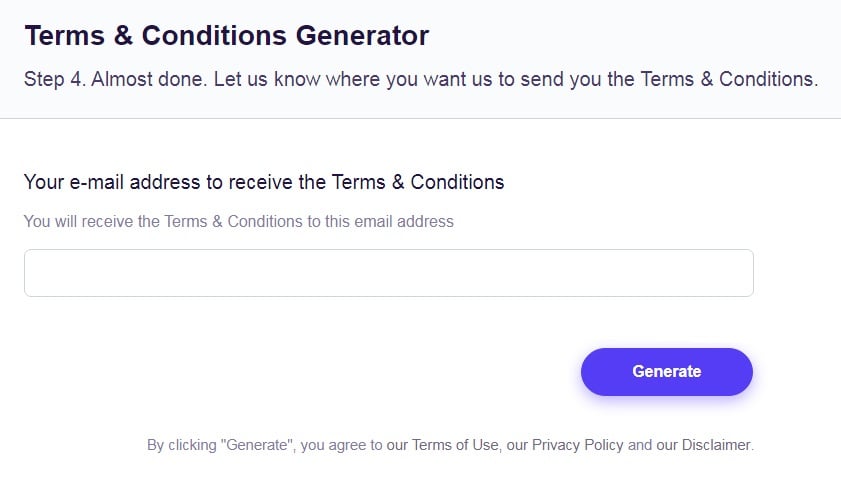
Once generated, you can copy and paste your Free Terms and Conditions agreement on your website or app or link to your hosted Free Terms and Conditions page.
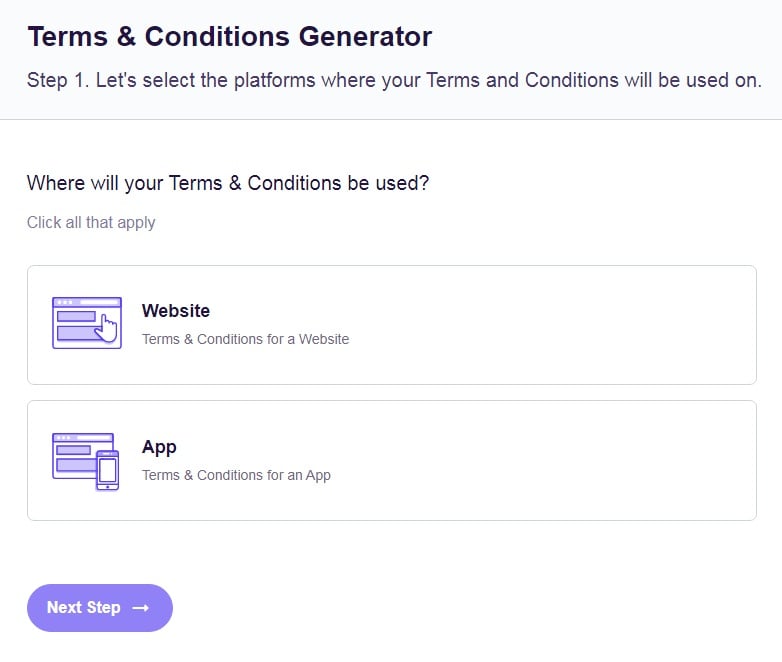
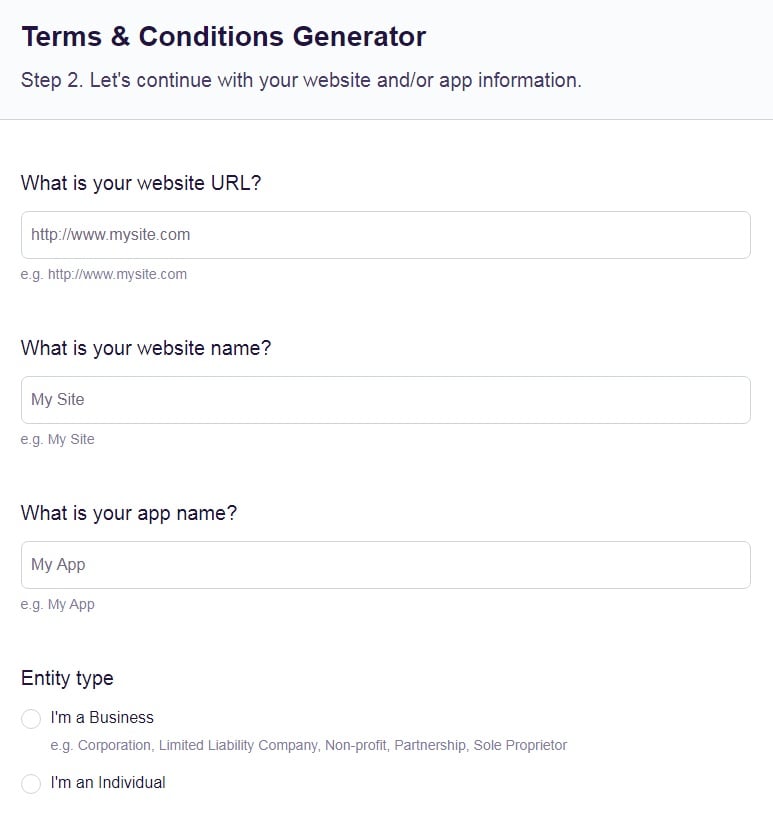
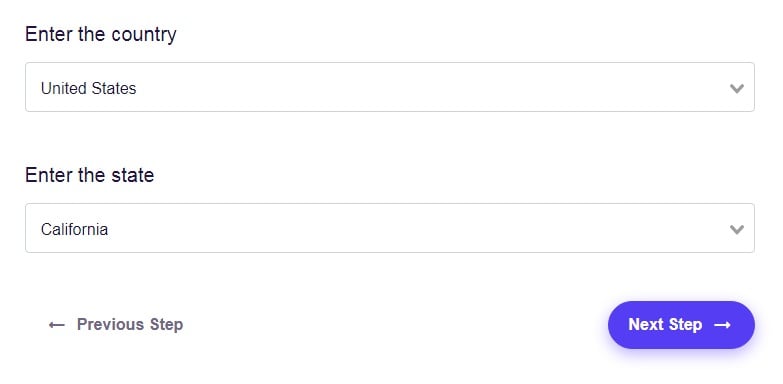
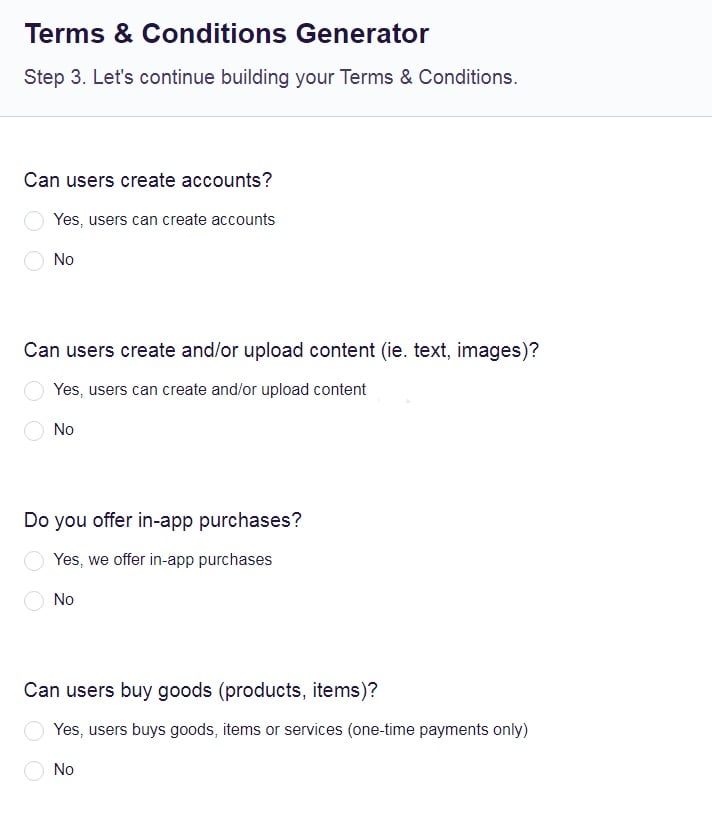
- 1. Why Have Payment Terms Clauses in a Terms and Conditions Agreement?
- 2. What Information is Included in a Payment Terms Clause?
- 2.1. What the Customer Pays
- 2.1.1. How the Price is Calculated
- 2.1.2. Taxes
- 2.1.3. Shipping
- 2.1.4. Price Changes
- 2.1.5. Future Payments
- 2.2. Acceptable Payment Methods
- 2.3. When the Customer Pays
- 2.4. What Happens if the Customer Doesn't Pay
- 2.5. Other Points to Address in a Payment Terms Clause
- 2.5.1. Standard versus Express Terms
- 2.5.2. Acceptance of Quality
- 2.5.3. Refund Policy
- 3. Summary
Why Have Payment Terms Clauses in a Terms and Conditions Agreement?
The main reason for payment terms clauses is to avoid confusion and allow certainty on both sides. You can be confident your customer is making an informed decision to go ahead with a purchase, reducing the risk of a dispute arising later.
Depending on your jurisdiction, you may only be allowed to impose specific terms if they are clearly stated in your contract, Terms and Conditions agreement, or other relevant documents.
Some jurisdictions also have rules that give consumers stronger protection by requiring that any terms they sign up to are "fair." In many cases, a term is more likely to be considered fair when it is clearly stated in understandable language rather than hidden away or written in a confusing or ambiguous manner.
What Information is Included in a Payment Terms Clause?

While payment terms may cover complex situations or relate to detailed laws, they generally all relate to a few basic points:
- What the customer pays
- How the customer pays
- When the customer pays
- What happens if the customer doesn't pay
Let's look at each point a bit deeper.
What the Customer Pays
This information includes a number of sub-points to consider, including the following.
How the Price is Calculated
Often pricing for a product or service is straightforward, but sometimes you may need to clarify it.
For example, a web hosting company might charge a flat rate for a site that gets up to a certain number of visitors or amount of data each month, then charge a variable fee for any use over this limit. You'll need to make things like this clear in your Terms and Conditions agreement.
Taxes
Whether you must include sales and similar taxes in your pricing may depend on your jurisdiction. You may find it useful to include a payment terms clause that states whether or not your prices include taxes.
Shipping
As with taxes, your prices may or may not include shipping. You'll normally need to make this clear at the point of purchase, for example at a virtual checkout on your site. You may find it useful to include a payment terms clause that states whether or not your prices include shipping, how it's calculated and what shipping options are available and for what costs, if applicable.
Price Changes
You may want the ability to be able to change prices at some point before completing a sales and delivering goods. This is most appropriate in situations where your input costs are very variable and unpredictable.
Usually you can't change a price after accepting and confirming an order. However, you may have the right to refuse to accept and process an order unless the customer agrees to the changed price. Often this is simply a matter of the relevant contract law in your jurisdiction, but stating your position in a payments term clause can avoid confusion.
Allied Rubber notes how it can and can't change prices:

Future Payments
Rather than charge a one-off fee, you may use a subscription or recurring payments model. Examples include subscription boxes (such as where you ship a set of products every month) and software licensing (such as where using a program carries an annual fee).
Here's an example of a clause that addresses this, from Crown and Glory:

You'll usually need specific payment clauses to cover your intention to collect additional payments later on. These need to address points including:
- When you will take the extra payment
- If and when you can increase the payment amount
- Whether you'll give any notice before taking each payment
- When and how the customer can cancel the agreement and not have to make further payments
- The consequences of cancelling (for example, at what point the customer loses access to a streaming service)
Acceptable Payment Methods

You should have a clause that details what payment methods you accept. This could include or exclude:
- Cash
- Check
- Bank transfer
- Credit and other bank cards
- Specific payment processing services such as PayPal or Stripe
- Loyalty program points
- Gift cards
You should also make clear whether you charge an extra fee for any particular method of payment. Check the rules in your jurisdiction as in some places you either cannot charge extra for particular methods, or you cannot charge an extra fee that's more than the actual processing costs you bear.
It can be useful to say whether you keep any payment details (such as credit card numbers) on file for processing future payments.
You should also have a clause that says what currencies the customer pays in. If you accept currencies other than the one the price is listed in, you should say whether you charge extra fees and how you determine the conversion rate.
Gencom Technology clearly explains how it deals with currencies and conversion rates:
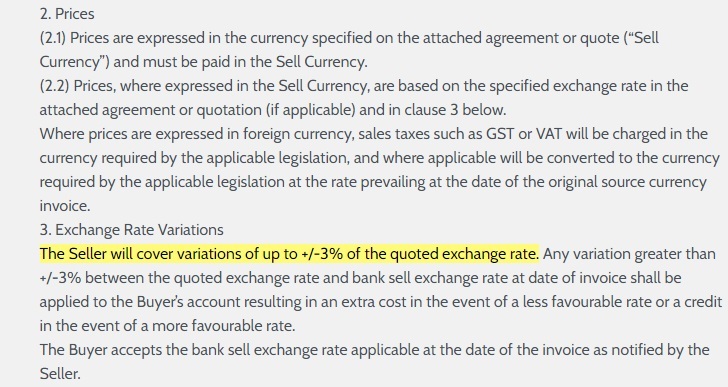
Gencom Technology Terms and Conditions: Prices clause
When the Customer Pays
You should have a clause that explains when the customer pays for goods or service. Examples could include:
- Upon placing the order
- When the goods are despatched or service received
- When the goods are delivered
- On a specific future date (for example if you bill the customer monthly to cover all purchases)
You should also detail whether you offer any discounts for early payment or impose any penalties for late payments. Whether you can do the latter will depend on the rules in your jurisdiction.
Cartridge Shop explains its payment period and late payment penalty:
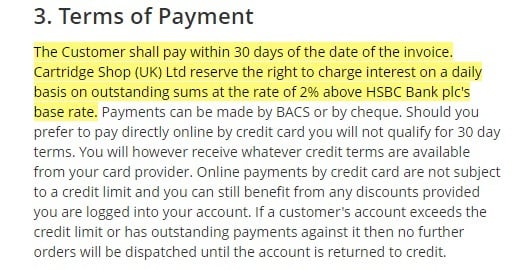
What Happens if the Customer Doesn't Pay
This is one of the most important terms as it's arguably the most likely to lead to a legal dispute. Usually it's not a major issue if the customer has to pay up front (though you may need to address what happens with a bounced check or similar problem). Instead it's more relevant to cases where the customer is able to pay later.
You will need to clearly set out the consequences of non-payment so that the customer understands and agrees to them when placing an order. Some possible consequences include:
- Charging a restocking fee
- Requiring the customer to return goods
- Cancelling or disabling a service (for example by revoking access to a streaming video site)
- Imposing interest charges on top of the payment
- Charging a penalty fee to cover the costs of chasing up payment
These terms will act alongside your rights to pursue the payment through the court system.
Split The Bills notes multiple consequences for non-payment as well as explaining how and when they are triggered:

Non-payment terms give you rights to impose consequences. To show goodwill, you could include a clause that says you won't enforce these rights if a customer is disputing a payment in good faith and the dispute hasn't yet been resolved.
Other Points to Address in a Payment Terms Clause

You may want to cover the following points in your payment terms clause.
Standard versus Express Terms
Standard terms are those that apply to all customers by default. Express terms are those that apply to a specific customer or transaction, for example if you negotiated a discounted price or allow a longer term before payment.
You should make clear that the standard terms apply in full to all customers in the absence of any express terms.
Any express terms override the corresponding standard term.
Acceptance of Quality
You may require a customer to confirm receipt of goods or pay upon delivery. You can include a clause saying this confirmation doesn't constitute the customer accepting the goods are of satisfactory quality and thus losing their right to complain or seek a refund.
This is a clause that benefits the customer, so not all sellers include it. It's mainly a way of building trust among customers.
Refund Policy
You should include a clause explaining your refunds policy, or a link to your complete and separate Return and Refund Policy if you have one.
This should address both the customer's legal rights in your jurisdiction and any policies you operate that go beyond this.
Points to address include:
- What can trigger a refund (faulty goods, incorrect sizing, customer changing their mind)
- Whether you pay a refund as cash or credit against future purchases
- Whether you only offer replacement items
- How long the customer has to ask for a refund or replacement
- Who pays the cost of returning goods and sending out a replacement
Apple has a detailed returns and refund policy but opens with some key points:
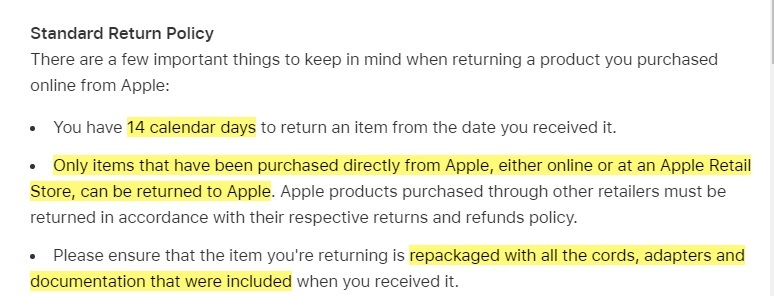
Chloe explains that customers pay for returning products and how this works:
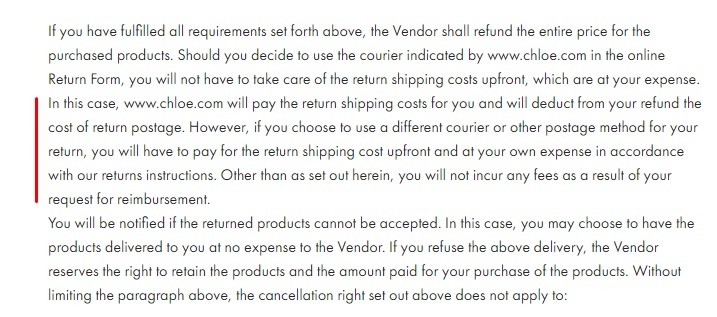
Summary
Let's recap what you need to know about payment terms clauses:
- Payment terms clauses make sure both sides understand an agreement, reducing the risk of disputes
- Some payment terms are only allowed or enforceable when you clearly state them in your Terms and Conditions agreement
-
Terms you could include about what the customer pays include:
- How you calculate the price
- Whether and how you include taxes and shipping
- Whether you can change the price before accepting or fulfilling an order
- How future payments such as recurring charges or subscriptions work
-
Terms you could include about how the customer pays include:
- What payment methods you accept
- Whether you charge extras fees for specific payment methods
- What currencies you accept and how you convert prices
-
Terms you could include about when the customer pays include:
- At what point payment is due (eg up front, on delivery, on a delay)
- Whether you offer any early payment discount or impose late payment penalties
-
Terms you could include about what happens if the customer doesn't pay include:
- The consequences of non-payment (beyond your right to sue)
- Whether you will put these rights on hold if the customer disputes a payment
-
Other points to cover include:
- How your standard and express terms interact
- Whether accepting delivery counts as accepting the quality of goods
- How you accept and process refund requests
